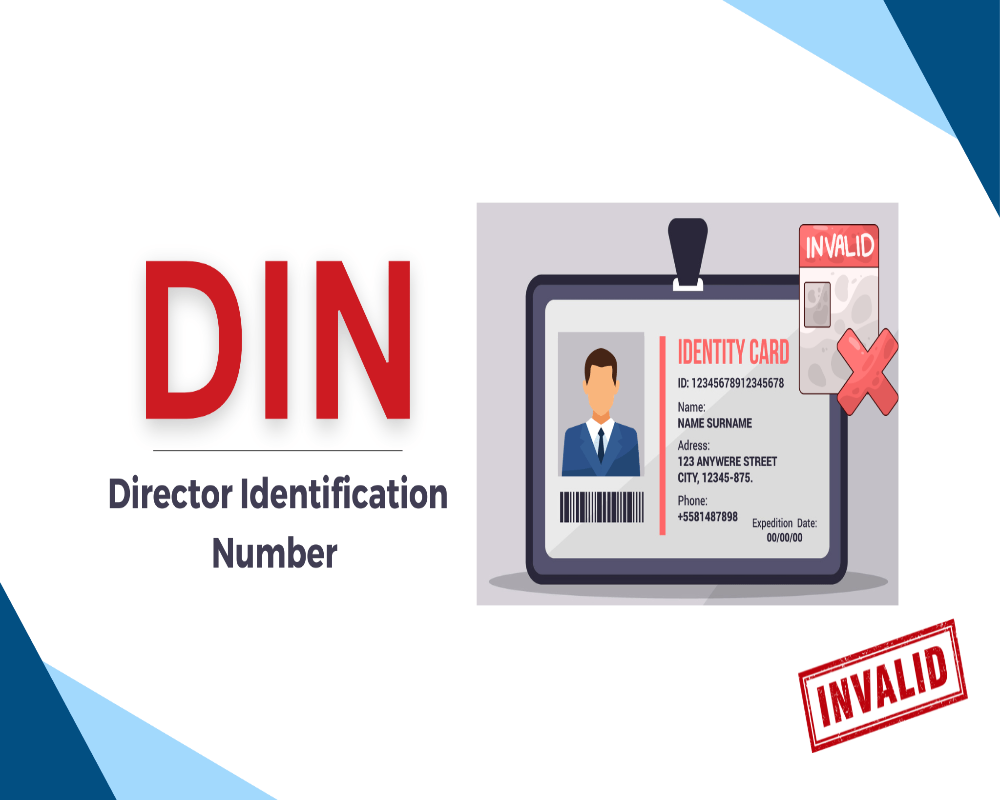Consequences of Having Invalid DINs
Introduction
A Director Identification Number (DIN) is a unique eight-digit number issued by the Ministry of Corporate Affairs (MCA) in India to individuals intending to become directors of companies. Under Section 152(3) of the Companies Act, 2013, no individual can be appointed as a director unless they possess a valid DIN. Maintaining an active and valid DIN is critical for legal compliance and corporate governance. If a DIN becomes invalid due to non-compliance, outdated KYC, or fraudulent declarations, it can lead to serious consequences for both the individual director and the company. This article establishes the consequences of having invalid DINs and the risks involved.
Ineligibility to Act as a Director
An individual with an invalid or deactivated DIN cannot be appointed or continue as a director in any company. Any decisions, approvals, or actions taken by such a person in their capacity as a director may be considered legally void, affecting the company’s governance and decision-making process.
Deactivation of Director’s Status
A DIN can become invalid due to non-filing of DIR-3 KYC, incorrect documentation, or detection of fraudulent identity. Once deactivated, the director’s status is updated in MCA records, and the person is marked as disqualified or “DIN deactivated due to non-compliance”. This affects their reputation and eligibility across all companies in which they hold directorships.
Inability to File e-Forms and ROC Returns
An invalid DIN prevents the director from signing and filing statutory forms like MGT-7, AOC-4, DIR-12, and other e-forms with the Registrar of Companies (ROC). This may result in non-filing of annual returns or other compliance documents, exposing the company to penalties and loss of good standing.
Penalty and Late Fees
Failure to update DIN-related compliance, such as filing DIR-3 KYC, attracts a late fee of ₹5,000 (as per Rule 12A of the Companies (Appointment and Qualification of Directors) Rules). Continuous default can lead to further monetary penalties for the director and the company under Sections 172 and 450 of the Companies Act.
Disqualification and Prosecution Risk
A director holding an invalid DIN may be deemed to have violated statutory provisions, resulting in potential disqualification under Section 164 of the Companies Act. In severe cases, prosecution may follow if it is found that the invalid DIN was used to falsify company records or evade legal obligations.
Impact on Associated Companies
A director with an invalid DIN affects all companies in which they hold directorships. These companies may:
- Face issues with form submissions
- Experience delays in statutory approvals
- Be required to replace or regularize the non-compliant director
This causes operational disruption and may affect investor confidence.
Ineligibility for New Appointments
An individual with an invalid DIN cannot be appointed as a director in any new company until the DIN is reactivated or rectified. This blocks career advancement and restricts participation in corporate governance or entrepreneurial activities.
Reactivation Requires Compliance
To reactivate an invalid DIN, the individual must:
- File DIR-3 KYC or DIR-3 KYC-WEB
- Pay the applicable late fee
- Rectify any discrepancies in identity documents
Only after successful verification will the DIN be reactivated by the MCA.
Conclusion
An invalid DIN undermines a director’s legal authority and impacts the functioning and compliance of associated companies. It leads to disqualification, financial penalties, reputational loss, and regulatory scrutiny. Maintaining a valid and active DIN through timely compliance, accurate documentation, and proper conduct is essential for all directors. Awareness and proactive adherence to DIN regulations help ensure smooth corporate operations and personal eligibility in the corporate ecosystem.
Hashtags
#InvalidDINs #DINConsequences #BusinessCompliance #LegalIssues #CorporateGovernance #RegulatoryRisks #FinancialImplications #TaxConsequences #BusinessIntegrity #RiskManagement #ComplianceMatters #DINRegulations #CorporateResponsibility #FraudPrevention #Accountability #BusinessEthics #LegalCompliance #IndustryStandards #ProtectYourBusiness #StayInformed


0 Comments